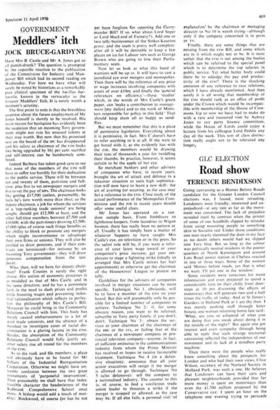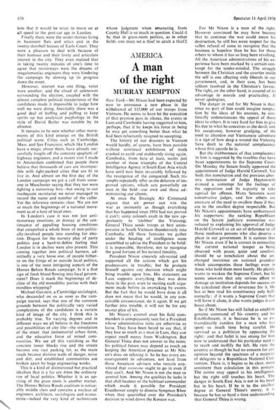GLC ELECTION
Road show
TERENCE BENDIXSON
Going canvassing as a Homes Before Roads candidate for the Greater London Council elections was, I found, most revealing. Londoners were friendly, interested and un- prejudiced—at any rate as far as the move- ment was concerned. The lack of prejudice revealed itself by contrast when the printer of some of our handbills slipped by mistake from using mourning purple to something akin to Socialist red. Under those conditions one man nearly slammed the door in my face as no doubt others would had we slipped into Tory blue. But so long as the colour was politically neutral residents in the poorer quarters of North Kensington and around Lots Road power station in Chelsea reacted in one of three ways. Some of the women said 'Homes before roads, yes that is what we want. I'll put one in the window.'
Some residents were voracious for more information and even prepared to spend a considerable time on their chilly front door- steps at 10 pm discussing the effects of motorways that will generate two and a half times the traffic of today. And in St James's Gardens in Holland Park at I am (by then I was merely pushing stuff through letter boxes), one woman returning home late said: 'What, are you so ashamed of what you are doing that you sneak about doing it in the middle of the night?' But again one got interest and even sympathy through being able to reply that such strange nocturnal canvassing reflected the independence of our movement and its lack of a mindless party machine.
Then there were the people who really knew something about the prospects for London and who had their own views. Clive Wilson, secretary of the Norland Society in Holland Park, was such a one. He believes that Londoners can have their cars and pleasant neighbourhoods provided that far more money is spent on motorways than even the £1,700 million proposed by the Conservative Gt.c. I spent an hour on the telephone one evening trying to persuade him that it would be wiser to move on at all speed to the post-car age in London.
Finally there were the under-thirties living in basement flats and attics and in the twenty-doorbell houses of Earls Court. They were a pleasure to deal with because of their humour and their lively and articulate interest in the city. They even realised that in taking twenty minutes of one's time to agree that motorways were the dreams cf megalomaniac engineers they were hindering the campaign by slowing up its progress down the street.
However, interest was one thing, votes were another; and the cloud of unknowns surrounding the election, coupled with the almost complete political inexperience of the candidates made it impossible to judge how well we were doing. Inevitably there was a good deal of huffing and puffing to keep spirits up but analytical psephology in the style of David Butler was notable by its absence.
It remains to be seen whether other move- ments of this kind emerge on the British political scene. Cities such as Cambridge, Mass. and San Francisco, which like London have a magic about them, have already suc- cessfully fought off the concrete spaghetti of highway engineers, and a recent visit I made to Amsterdam confirmed that people there believe that thousands of cars are incompat- ible with tight-packed cities that are fit to live in. And almost on the first day of the London campaign we got a call from some- one in Manchester saying that they too were fighting a motorway box—but owing to our inadequate secretariat we never managed to record the name and number of the caller. Yet the inference remains clear. We are not so much the beginnings of a national move- ment as of a host of local ones.
In London's case it was not just anti- motorway emotions, or dismay at the con- tinuance of appalling housing conditions that catapulted a whole brew of non-politic- ally-involved people into standing for elec- tion. Disgust for the nursery play of party politics and a hard-to-define feeling that London is in decline were also present. This coming together into political harness, ad- mittedly a very loose one, of people hither- to on the fringe of or outside local politics, is one of the most intriguing aspects of the Homes Before Roads campaign. Is it a first sign of fresh blood flowing into local govern- ment? Does it mark the beginnings of de- cline of the old monolithic parties with their mindless whipping?
Michael Gerstein, a Cambridge sociologist, who descended on us as soon as the cam- paign started, says that one of the common grounds between the politically very varied complexions of the candidates is a certain kind of image of the city. I think this is probably true. To varying degrees and in different ways we all believe in the freedoms and possibilities of city life—the stimulation of the street, that immemorial urban form, and the educative force of mixed com- munities. We see all this vanishing as the concrete tower blocks rise and the streets become one vast parking lot, as the main roads become divisive walls of danger, noise and dirt, and established communities are broken apart by huge engineering works.
This is a kind of disinterested but practical idealism that is a far cry frtirn the ordinary run of local politics. Whether it is an up- rising of the grass roots is another matter. The Homes Before Roads coalition is notice- ably middle class and contains a nucleus of engineers, architects, sociologists and econo- mists—indeed the very kind of technocrats
whose judgment when emanating from County Hall is so much in question. Could it be that in grass-roots politics, as in other fields, one must set a thief to catch a thief?,







































 Previous page
Previous page